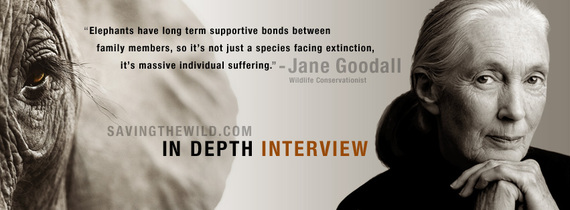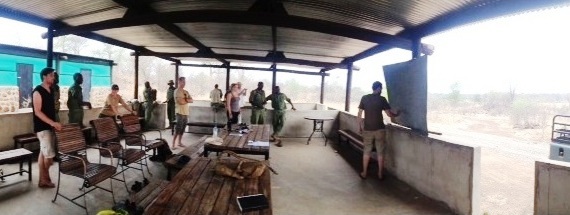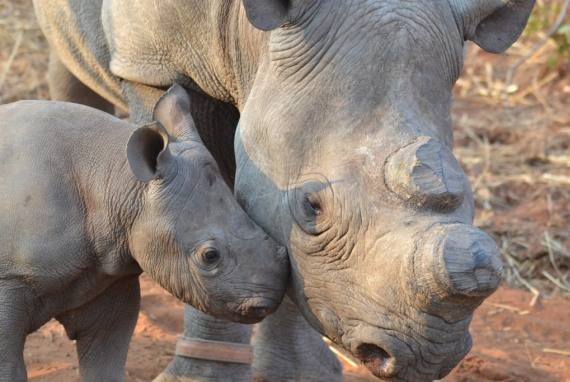In the first part of the IAPF Green Army series, myself and six volunteers participated in our first anti poaching full moon patrol, lending our eyes and ears to rangers on the frontline. Most of the volunteers camped out in the bush are experiencing Africa's wild for the very first time, and as a child of Africa, I take great joy in seeing foreigners fall in love with my homeland - because we will only protect what we love, and right now Africa needs all the love it can get.
We are currently experiencing a wildlife holocaust, driven by Asia's ravenous demand for rhino horn and elephant ivory - symbols of status and wealth - and unless we reach a critical mass of global citizens all over the world drumming the message that our iconic species are not for sale - the gong of extinction will soon sound yet another epic failure of humanity.
There is an eco warrior in all of us, because ultimately we are all children of nature. It is what connects us, and what binds us. But in this battlefield of greed, many humans have stumbled into the dark side, and that is why it is so important that we carve a path so that they can find their way back home.
Living amongst the rangers in Victoria Falls, so close to the land, is like playing a supporting role in a seething theatre where every day is full of wonder. Senses become sharpened, and there are times when I suddenly find myself absorbing every minuscule detail of my surroundings. Just before we set out on our first foot patrol sweeping for snares, Corey, Senior Ranger and Volunteer Coordinator gave us a lesson in the IAPF open air classroom that he titled "dangerous game".
How Corey explains it, the animals out here in the African bush aren't confrontational with humans, we're simply not on the menu, and that includes the big cats; lions, leopards and cheetahs. If an animal gets into a fight they're putting themselves at high risk, because it's not like they can call 911 "I need an ambulance." However, if animals feel threatened, they will defend themselves, which is why we must respect their space and never get into a situation where they feel cornered.
Take lions, for example, they're more likely to mock charge than turn you into a meat sandwich, but whatever you do, do not run! If you run you're food - and you will never ever outrun a big cat. And P.S. they can also climb trees. You just got to stand your ground, suck it up, roar your lungs out, throw you hands up in the air, and will your heart to not jump out of your chest.
Now buffalo on the other hand, have that Mafioso look about them, and will stare at you as if you owe them money. These grazers are by far the most unpredictable of the land animals, and if a buffalo charges you, run like the wind, because buffalo don't mock charge.
The rest of the herbivores are mostly harmless, and will just saunter off if you get too close, but you don't want to get between an elephant, rhino or hippo mama and her calf. Their maternal instincts to protect their young would rival even the most protective human mother, and all these species weigh upwards of a ton, and that's a whole lot of angry mama.
After wrapping up our snare patrol, which included the company of a herd of sable, one of the most majestic of the antelope species, we came across a mama rhino and her six week old calf. We gave them space, but they were happy to potter around us. It was a sight that could melt even the most hardened heart. I looked at this doting mama, clad in a prehistoric suit of armour impervious to almost anything except a bullet, and then I looked at her precious calf, his tiny little body cuddled up against his mother's chest, sheltered, and completely unaware that he has been born into genocide against his species.
In October I was on assignment at The Rhino Orphanage in Limpopo, South Africa, and I spent 10 days with rhino calves that had gone through extremely traumatic experiences, such as Baby Nthombi who suffered at the hands of poachers that slashed and cut at her face with axes and machetes 21 times as she tried to defend her mutilated mother.
Rhinos are emotional beings, just like humans. They feel pain and fear, and they feel sadness and grief. But, like humans, they are resilient, and they can overcome tragedy and go on to live happy lives. We cannot bring back the mothers, but we can borrow courage from them, and move forward in the belief that it's not too late to save the living. Somewhere in Africa, a rhino is killed every seven hours, and 2014 is heading towards a record high for rhino poaching. People everywhere are struggling to hold on to the hope that things will get better.
Well hope is not enough. Every one of us, if we really want to save our iconic species, need to be agents for change. Not everyone can come to Africa and volunteer, but what we buy and what we wear yanks the great chain of command, and what we stand for is amplified through social media.
We need to remind ourselves that the greatest superpower in the world is public opinion. It is the reason commercial whaling was banned worldwide, seal fur coats are more treacherous than trendy, and it's the reason we overcame Africa's poaching crisis in the eighties.
The greatest threat to wildlife is the belief that someone else will save it. Right now, in this generation, we can, and we must do more.




